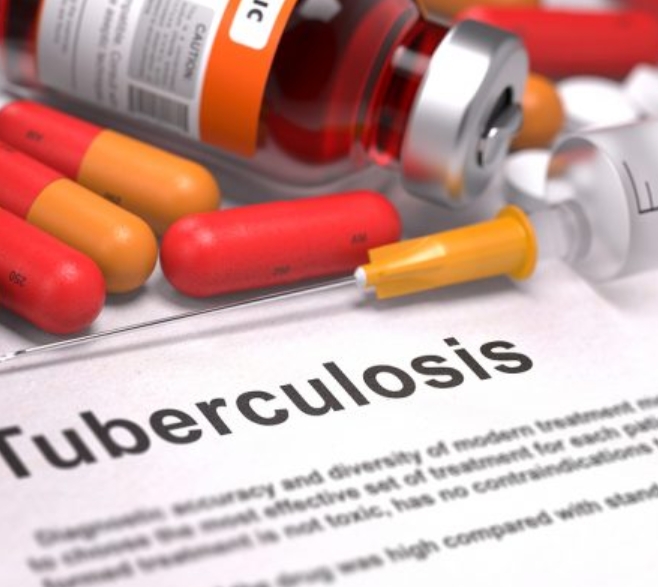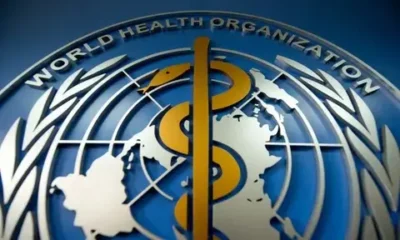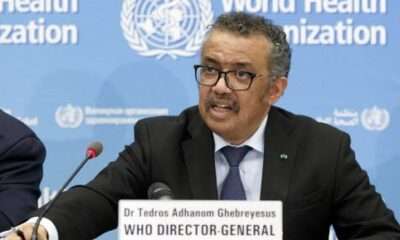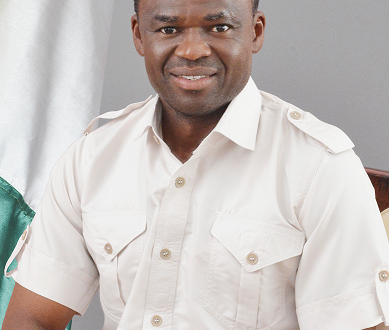Health
Nigeria’s TB Case Finding Rises By 50%, Says WHO
Published
1 year agoon
By
Editor
The World Health Organisation said Nigeria had significantly increased its national Tuberculosis case finding by 50 per cent in 2021 using innovative approaches.
The WHO Regional Director for Africa, Dr Matshidiso Moeti, made this known in her message in commemoration of World TB Day.
World TB Day is marked yearly on March 24 to raise public awareness about the devastating health, social and economic consequences of this preventable disease and call for accelerated action to end it.
READ ALSO: 135 Million Africans Have Hearing Problems, Says WHO
This year’s theme, ‘Yes, we can end TB’, highlights the need to ensure equitable access to prevention and care, in line with the drive towards Universal Health Coverage and the Sustainable Development Goals.
Dr Moeti said it was important to find and diagnose cases of TB so that the patients can be treated, and their contacts offered preventive medication.
“Nigeria is an example of a country that managed to significantly increase national TB case finding by 50 per cent in 2021 using innovative approaches such as the expansion of the daily observed treatment protocols, use of digital technologies, Community Active Case Finding, and enlisting Public Private Mix initiatives.
“TB requires concerted action by all sectors: from communities and businesses to governments, civil society and others,” she said in a press statement.
READ ALSO: Cancer May Kill One Nillion Africans Yearly By 2030 – WHO
She said the African Region was on the threshold of reaching a 35 per cent TB death reduction as there had been a 26 per cent reduction in TB deaths between 2015 and 2021.
“Seven countries — Eswatini, Kenya, Mozambique, South Soudan, Togo, Uganda, and Zambia—have reached a 35 per cent reduction in deaths since 2015,” she noted.
She, however, decried the challenges in TB prevention and control.
“First, the delayed diagnosis and testing. There is still a notable gap between the estimated number of new infections and case notifications of TB: 40 per cent of people living with TB did not know of their diagnosis or it was not reported in 2021. One million people are living with TB in the region and have not been detected.
“Second, the link between TB and HIV. Approximately 20 per cent of people newly diagnosed with TB are also living with HIV infection.
READ ALSO: Africa Records 26,000 Cholera Cases, 660 Deaths In January – WHO
“Third, the multi-drug resistant TB. In the African region, only 26 per cent of all people living with multi-drug resistance are receiving the appropriate treatment.”
Meanwhile, she hailed the member states for the increasing uptake of new tools and guidance recommended by WHO, resulting in early access to TB prevention and care, and better outcomes.
“In the African Region, the use of rapid diagnostic testing has increased from 34 per cent in 2020 to 43 per cent in 2021, which will improve countries’ ability to detect and diagnose new cases of the disease.
“We must work together to develop innovative approaches to reach vulnerable populations and ensure that they have access to quality TB care and management.
“The second UN High-level Meeting on TB in September 2023 will provide a rare opportunity to give global visibility to the disease and mobilize high-level political commitment to end TB.
“Ending TB is feasible with the decline in TB deaths and cases, and the elimination of economic and social burdens associated with it.
“Specially today, I urge leaders, governments, partners, communities, and all stakeholders to urgently foster the resilient health systems required to accelerate the TB response so that we can reach the Sustainable Development Goals targets by 2030. Yes, we can end TB in our lifetime,” she added.
You may like


Nigeria Becomes First Country To Introduce New 5-in-1 Vaccine Against Meningitis – WHO


WHO Raises The Alarm On Looming Diseases, Disasters


Prepare For Next Pandemic, UN Chief Tells World


Gaza Population In ‘Grave Peril’, Says WHO


135 Million Africans Have Hearing Problems, Says WHO


Africa Records 26,000 Cholera Cases, 660 Deaths In January – WHO

By Silver Yeibake
Autism, commonly known as Autism Spectrum Disorder (ASD), is a neurodevelopmental disorder that affects communication, social interaction, and behavior. Autism is referred to as a spectrum condition since it can manifest in a variety of symptoms and abilities. While the actual cause of autism is unknown, evidence suggests that genetic and environmental factors interact to influence its development.
The risk factors include a sibling with autism, advanced age of parents, exposure to certain air pollutants and pesticides before birth, extreme prematurity, mothers with diabetes, immune system disorders or obesity, any difficulty with delivery leading to deprivation of oxygen to the baby’s brain, fever during pregnancy, lack of certain vitamins minerals during pregnancy, and certain genetic conditions, such as Down, fragile X, and Rett syndromes.
“Risk factors can not on their own cause a disease. However, they can increase the likelihood of that disease in a person.”
It is important to know that contrary to trending claims online, there is no scientific or medical evidence that vaccines or consumption of sugar are risk factors for autism.
READ ALSO: Kidney Stones: What You Need To Know
Autism is defined by difficulties in social interaction and communication. Individuals with autism may struggle to grasp social cues, maintain eye contact, and engage in typical back-and-forth conversations. Some people may also engage in meaningless, repetitive actions, such as hand-flapping or rocking, and have strong interests in specific areas.
It is essential to remember that autism is a lifelong diagnosis, but with early intervention and adequate care, people with autism can live fulfilling lives.
Autism treatment frequently includes behavioral therapy, speech therapy, occupational therapy, and social skills training. Each individual with autism is unique, thus interventions should be tailored to meet their personal needs and strengths.
In spite of the difficulties that autism can cause, many people with autism possess unique talents and abilities. Some people may succeed in fields such as music, art, mathematics, or programming, thus it is important for society to acknowledge and honor the qualities and achievements of people with autism.
In summary, autism is a complicated and diverse disorder that affects individuals in various ways. By raising autism knowledge, understanding, and acceptance, we can build a more inclusive society in which people with autism can thrive and attain their full potential.
Dr. Yeibake, Weriwoyingipre Silver.
Senior Registrar,
Faculty Of Pediatrics,
WACP
Health
Don Confirms ‘Zobo’ As Antihypertensive Therapy
Published
1 month agoon
March 10, 2024By
Editor
The Deputy Vice Chancellor, University of Nigeria Enugu Campus, UNEC, Prof. Daniel Nwachukwu, after research findings and clinical trials in both animals and human, has confirmed that Hibiscus Sabdariffa, popularly called ‘zobo’ drinks, has all the curative potentials as an antihypertensive therapy.
Nwachukwu, who is a Professor of Cardiovascular Physiology in the university, stated that the antihypertensive effectiveness of the Hibiscus Sabdariffa (zobo) was comparable to those of known antihypertensive drugs that are popular in the retail pharmacies, adding that zobo’s availability, cheapness and absence of side effects make it attractive as an alternative therapeutic agent in mind to moderate hypertensive subjects.
He however cautioned that care should be applied to avoid abuse in the consumption of Hibiscus Sabdariffa (zobo), adding that the therapy could interfere with some anti-malaria drugs while its high dose was also reported to have toxic effects on the liver and kidney.
READ ALSO: How Airline Pilots Fell Asleep Mid-flight – Safety Agency Reveals
Nwachukwu’s discoveries were contained his 201st Inaugural Lecture of the University of Nigeria with the topic “The Marriage Between the Cardiovascular System and Hibiscus Sabariffa: Let no One Put Asunder,” delivered at the moot court hall, Law faculty of the University of Nigeria, Enugu campus.
The DVC warned that Hibiscus Sabariffa consumption is not recommended for persons with low blood pressure because of its well established hypotensive action, advising that during combined therapy with antihypertensive drugs, the blood pressure, BP, must be carefully monitored.
He recommended that industrialists and investors should support large scale production of Hibiscus Sabariffa beverage and its distribution to rural communities in Nigeria, particularly since the raw materials (Hibiscus Sabariffa calyx and water) are cheap and readily available.
READ ALSO: Man Stabs Two Women To Death At A Mexico Varsity
According to Nwachukwu, “This lecture is intended to draw the public attention to our research efforts and unveiling the antihypertensive ability of Hibiscus Sabariffa which is called zobo in our common parlance. What we used for our studies was the same concentration as the locally produced zobo, and we found out that it exerted significant antihypertensive ability, in some cases even higher than the antihypertensive drugs and also did combination therapy with other antihypertensive drugs.
“What is significant is that this zobo is within us, it’s very cheap and it does not have any side effects compared to other antihypertensive agents. The raw material is just to buy zobo, prepare it under hygienic conditions, boil water and put it, sieve it and drink. It may have a sour taste but we do not encourage people to add things like pineapple or sugar in order to make it sweet, because once you do that, you are diluting or reducing its antihypertensive effectiveness.
“We have demonstrated it, both in animal studies and in humans. We are the first to do clinical trials, using mild to moderate antihypertensive Nigerians and we found it very useful. Some of the results show that one can actually use it and we equally saw that you can use it to prevent even diabetes from occurring because it reduces the rise in glucose level.”
READ ALSO: Adolescent Girls Face Risks Of Sexual Violence – UNICEF
Vice Chancellor of the University, Professor Charles Igwe while summarizing the lecture said that the lecture was in three dimensions; one on health grounds, another in academics and the third an economic value.
“Its economic in the sense that we can also begin to use what God has given us to make money. Maybe because God gave us everything in abundance in this country, we don’t recognize the simplest things God gave us in our environment. Therefore, what we are saying is that we should begin to, at all these pure water productions and incorporate zobo production so as to make money out of it.
“The university has made its contribution through our laboratories and it’s now left for the business community and the industries to come and buy into it and start widening it and make it very economic,” Igwe suggested.
Vanguard

By Silver Yeibake
Hi, did you know that Tuesday 12th March, 2024 is world Glaucoma day?Kindly avail yourself of this opportunity to learn about this important health issue as presented below:
Glaucoma is a dangerous eye disorder that damages the optic nerve, causing visual impairment or permanent blindness if not treated.
The optic nerve transmits visual information from the eye to the brain. Damage to this nerve might cause gradual visual loss that is not immediately obvious.
Worldwide, this disease affects 67 million people and contributes 6.7 million of blindness in this population. Glaucoma is the leading cause of blindness in the world.
The total number of cases is expected to increase to 111 million by 2040. Males are slightly more affected than females.
One of the basic causes of glaucoma is an increase in intraocular pressure (pressure within the eyeball), which can eventually damage the optic nerve (the nerve that makes seeing possible). This increase in pressure could be caused by an accumulation of aqueous humor, the fluid that nourishes the eye.
FROM THE AUTHOR: Food Poisoning: What You Need To Know
There are several forms of glaucoma, including open-angle glaucoma, angle-closure glaucoma, normal-tension glaucoma, and secondary glaucoma, each with unique characteristics and treatment choices.
Some of the risk factors for glaucoma include sustained elevation of intraocular pressure, family history of glaucoma, race (African, Asian), short-sightedness, long-sightedness, age over 50, previous eye injury or surgery, hypertension, diabetes mellitus, migraines, and prolonged steroid therapy.
Glaucoma symptoms may not appear until the problem has advanced sufficiently, therefore regular eye checks are essential for early detection. Blurred vision, eye pain, nausea, and light halos are some of the most frequent glaucoma symptoms. However, these symptoms might be mild or readily misinterpreted as other eye problems, emphasizing the significance of regular eye examinations.
Glaucoma treatment tries to reduce intraocular pressure and protect the optic nerve from further damage. This can be accomplished using a variety of approaches, including prescription eye drops, oral medicines, laser therapy, and surgical procedures. Treatment options are determined on the kind and severity of glaucoma, as well as personal characteristics such as overall health and medical history.
To summarize, glaucoma is a serious eye disorder that requires timely diagnosis and treatment to prevent irreversible vision loss. Regular eye examinations, early detection, and commitment to treatment plans are critical for protecting vision and eye health in glaucoma patients.
Thank you.
Dr. Yeibake, Weriwoyingipre Silver, a
Senior Registrar, Faculty Of Pediatrics, West Africa College of Physician (WACP), writes from Yenagoa, Bayelsa State.

Customer Drags NERC, AGF To Court Over Electricity Tariff Hike, Classification

Edo CJ Frees 4 Awaiting Trial Inmates In Correctional Centres In Benin

[UPDATED] Mbappe’s PSG Punish 10-man Barca To Reach Champions League Semis
Trending

 Metro3 days ago
Metro3 days agoWoman S*xually Abuses Child, Films It In Viral Video

 Entertainment4 days ago
Entertainment4 days agoJnr Pope: ‘That Guy No Suppose Knack Bell’ – Boat Captain Narrates His Own Side Of Story [VIDEO]

 News3 days ago
News3 days agoDeadly Flog: Girl Caught In Camera Beating Up Baby With Rod [VIDEO]

 Metro5 days ago
Metro5 days agoJUST IN: Bobrisky Jailed With No Option Of Fine

 News2 days ago
News2 days agoVideo: Moment Pastor Enenche Sent Lady Away For Giving False Testimony On The Altar

 Entertainment4 days ago
Entertainment4 days agoWhy Court Sentenced Bobrisky To Six Months In Prison

 Entertainment3 days ago
Entertainment3 days agoBoat Mishap: ‘This Is My Story’ – Movie Producer, Adanma Luke, Breaks Silence [VIDEO]

 News3 days ago
News3 days agoViral Video: Edo CP Orders Investigation, Mental Test For Police Constable

 News5 days ago
News5 days agoFULL LIST: Covenant Beats UI, FUTA To Retain Nigeria’s Best Varsity Spot

 News4 days ago
News4 days ago3rd Mainland Bridge Crash: Body Of One Of The Occupants Recovered
































